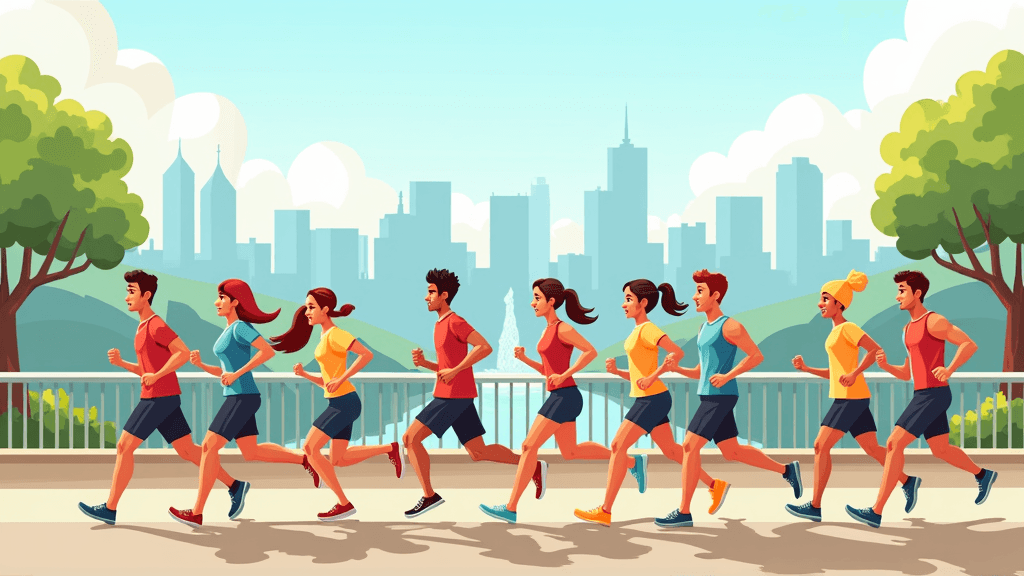In recent years, sports clubs socializing has emerged as a dynamic alternative to traditional nightlife, particularly as many nightclubs face closure. As the trend shifts, more individuals are finding community and connection through exercise social activities, leaving behind the heavy atmosphere of bars and clubs. With a significant portion of nightclubs shutting down across Britain, running clubs and fitness groups are attracting diverse crowds eager to enjoy evenings filled with camaraderie rather than alcohol. These alcohol-free social events promote health and well-being, becoming a vibrant hub for like-minded people who prioritize fitness and community over late-night revelry. This transformation not only offers a more wholesome way to socialize but also reflects a broader change in how young adults engage with their social lives.
The concept of socializing within athletic clubs is rapidly gaining traction as an appealing alternative to nightlife, reflecting a wider cultural shift. With the decline of conventional partying in nightclubs, exercise gatherings offer people a new way to connect, share experiences, and foster friendships, all while engaging in physical activity. This movement underscores the growing popularity of fitness-focused communities, where members come together to enjoy shared interests and meet new friends in a healthier environment. As organizations provide platforms for alcohol-free group interactions, many are embracing these healthier avenues for social connections, proving that a strong community spirit can thrive without reliance on alcoholic beverages.
The Shift from Nightclubs to Sports Clubs for Socializing
In recent years, many young adults have turned their backs on traditional nightlife in favor of more active social pursuits. With the decline of nightclubs, as evidenced by over a third of them closing down in Britain, sports clubs have emerged as appealing alternatives for social interaction. Clubs such as the Bath Road Beers Run Club have found success by promoting a community atmosphere centered around fitness rather than the consumption of alcohol. This shift indicates a significant cultural change in how socializing is perceived, particularly among the younger generation.
Members of sports clubs emphasize the numerous benefits of socializing through exercise, including physical wellness and emotional camaraderie. As Ethan Lee aptly noted, sport is becoming the new social drink, enriching people’s lives without the pitfalls associated with heavy drinking. Moreover, participating in these activities not only provides social opportunities but also enhances one’s fitness and overall health, making them ideal for modern social activities that prioritize wellness over hedonism.
Exercise Social Activities: A New Way to Connect
Exercise social activities, such as running clubs, provide numerous opportunities for individuals to connect over shared interests while simultaneously working out. The Bath Road Beers Run Club is a perfect example of how these groups create a sense of belonging and community. Participants enjoy a more fulfilling and healthier way to socialize, allowing friendships to blossom in an environment that supports physical fitness and well-being. This social model stands in stark contrast to the often-individualistic and sometimes isolating atmosphere of nightclubs.
Furthermore, these exercise-based gatherings are often more budget-friendly. Many members find that they can engage in social interactions without the hefty price tag of nightlife expenses. As George Staff mentioned, participating in a run club is a cost-effective way to enjoy social activities while building a healthier lifestyle. The inclination towards exercise and community-oriented events highlights a growing trend where individuals seek fulfillment beyond typical nightlife experiences.
The Rise of Alcohol-Free Social Events
The growing popularity of alcohol-free social events marks a significant transition in social culture, especially among younger demographics. Venues that offer no and low-alcohol options, like the Cheltenham nightclub Under The Prom, are capitalizing on this shift, providing a new way for people to socialize without the pressure of drinking. Events that focus on health-conscious options resonate with individuals who may not want to consume alcohol yet still desire a vibrant social life.
This emphasis on alcohol-free settings is also paving the way for increased participation in community-focused events. The rise of such offerings aligns with the preferences of a society seeking healthier lifestyle choices. Coupled with the feedback from industry leaders like Michael Kill, the message becomes clear: socializing is evolving, and establishments must adapt to meet these changing needs. As more people opt for sober events, the opportunity for sports clubs and similar organizations to flourish continues to grow.
Running Clubs: The Perfect Blend of Fitness and Community
Running clubs have surged in popularity as they seamlessly blend fitness and socialization. Members gather not only to partake in the physical activity of running but also to foster connections and support among like-minded individuals. Clubs like the Bath Road Beers Run emphasize teamwork, mutual encouragement, and shared experiences, which help to create a tight-knit community. This structure appeals particularly to those who prefer engaging socially in a healthier environment than the bar scene.
Moreover, running clubs exemplify how engaging in collective fitness activities can cultivate a sense of belonging. Socializing through organized runs allows members to share their successes, motivate each other, and enjoy the shared camaraderie of being part of a group that values community health. This trend caters to uniting individuals who prioritize active lifestyles while still seeking meaningful social interactions.
The Economic Impact of Nightclubs Closing
The economic landscape of nightlife is undergoing a metamorphosis due to the closure of numerous nightclubs. This decline represents more than a mere shift in social habits; it’s also reflective of changing consumer preferences, pushing many towards healthier options, such as sports clubs. As traditional nightclubs struggle to maintain patrons, businesses must innovate and reposition themselves to attract a demographic that increasingly values health, fitness, and community.
With many of their customers opting for exercise social activities instead, establishments reliant on late-night bar culture are compelled to rethink their business models. Nightclubs are now exploring options like daytime parties and health-focused offerings to regain traction. As Mr. Jordan indicated, adapting to these trends is crucial for nightlife businesses aiming to survive in a rapidly evolving market.
Transforming Nightlife: Incorporating Health and Community
With the decline of nightlife as a primary form of socializing, a shift towards integrating health and community into nightlife experiences is becoming evident. This transformation is marked by venues embracing elements that encourage well-being, such as organizing events that promote fitness and thereby contribute positively to the local community. Successful clubs are now taking strides to offer a mixture of traditional fun coupled with healthier lifestyle options.
This emerging approach is gaining traction as attendees increasingly seek experiences that are not solely based on alcohol consumption. By prioritizing social events that emphasize exercise and community involvement, venues are witnessing sustained interest from patrons who crave meaningful interactions. The blend of nightlife experiences with health-centered options showcases a holistic approach to socializing, aligning with the broader societal shift towards valuing wellness.
Sport as a New Social Concept
The assertion that sport is becoming the new social drink encapsulates a broader cultural change where physical activity and community bonding are fast eclipsing traditional forms of nightlife. Socializing through sports has emerged as an intuitive way to foster connections, allowing individuals to build relationships based on shared goals, mutual encouragement, and a love for fitness. This shift signifies a departure from solely socializing with a drink in hand.
In this context, sports clubs are not just places to engage in physical activity; they serve as valuable social hubs where individuals create lasting friendships. Participants like Safi Hicks Beach highlight how these clubs have redefined engagement with others, underscoring the communal aspect that comes with exercising together. The intrinsic value of combining fitness with socialization aligns perfectly with contemporary lifestyles that prioritize health and wellness.
The Future of Socializing: Trends and Predictions
As society begins to prioritize health and community, we can expect a continued rise in the popularity of exercise-focused social activities. The trend projected for the coming years indicates a further shift away from alcohol-centric nightlife toward inclusive environments that nurture wellness and foster connection. This pivot will likely be met with eager participation as younger generations navigate their social lives in pursuit of healthier alternatives.
Furthermore, as establishments adapt to this evolution, they will likely create more varied spaces that encourage both fitness and socialization. The emphasis on alcohol-free options is likely to usher in an era where new social hubs reimagine traditional nightlife. As individuals seek to lightheartedly socialize while maintaining their health, it is clear that the dynamics of how we connect are transforming before our eyes.
Frequently Asked Questions
Are sports clubs socializing opportunities replacing nightclubs for young adults?
Yes, many young adults are turning to sports clubs for socializing instead of traditional nightclubs. With the closing of numerous nightclubs in recent years, sports clubs like running and fitness groups are becoming popular social alternatives that emphasize health and community.
What benefits do people find in exercise social activities compared to nightlife?
Exercise social activities, such as running clubs, offer benefits like improved physical health, reduced alcohol consumption, and enhanced community connections. Participants often report feeling better and more energized after a workout rather than spending an evening consuming alcohol in clubs.
How do alcohol-free social events at sports clubs encourage participation?
Alcohol-free social events at sports clubs make participation more inclusive and appealing to those seeking a healthier lifestyle. These events allow individuals to socialize without the pressures of drinking, making them attractive options for those who prefer to avoid alcohol.
Why are fitness and community emphasized in today’s social activities?
Fitness and community are emphasized in social activities today as more people seek healthy lifestyle choices. Groups like running clubs provide a platform for social interaction while engaging in physical activities, aligning socializing with personal well-being.
How do running clubs foster a sense of community among their members?
Running clubs foster a sense of community by bringing together individuals with shared interests in fitness and socializing. Members often form friendships through regular meetings, encouraging one another and enhancing their social experience beyond traditional nightlife.
What trends are emerging in socializing for the younger generation?
The younger generation is increasingly gravitating towards sports clubs and exercise social activities as alternatives to nightclubs. This trend reflects a shift towards healthier social interactions that prioritize physical fitness and community connection over traditional drinking culture.
Are sports clubs an effective way to budget social outings compared to nightclubs?
Absolutely! Sports clubs often offer a more cost-effective way to socialize compared to nightclubs, where expenses can add up quickly with drinks and entry fees. Group runs or fitness classes usually have lower or no costs, making socializing affordable.
What role do day events play in the evolution of nightlife and socializing?
Day events, often organized by sports clubs or fitness groups, play a significant role in evolving nightlife by providing socializing opportunities that do not center around alcohol. These events allow for community engagement during the daytime, catering to individuals seeking a healthier lifestyle.
| Key Points |
| Sports clubs, like running clubs, are becoming popular alternatives to nightclubs for socializing. |
| More than a third of nightclubs in Britain have closed in the last five years. |
| 61% of 18 to 30-year-olds report going out less than in previous years, according to a survey. |
| Members of run clubs cite benefits like saving money, avoiding hangovers, and improving health while socializing. |
| Daytime parties and low-alcohol drink options are being embraced by nightlife venues as a response to changing social trends. |
| The shift towards socializing through sports highlights a growing focus on community, wellness, and active lifestyles. |
Summary
Sports clubs socializing is becoming a trend as people increasingly prefer activities like running over traditional nightlife options. This shift is driven by the desire for healthier social alternatives, as demonstrated by the recent closure of numerous nightclubs across Britain. Many individuals are now finding community and connection through sports, highlighting a cultural transition towards wholesome, active lifestyles.


